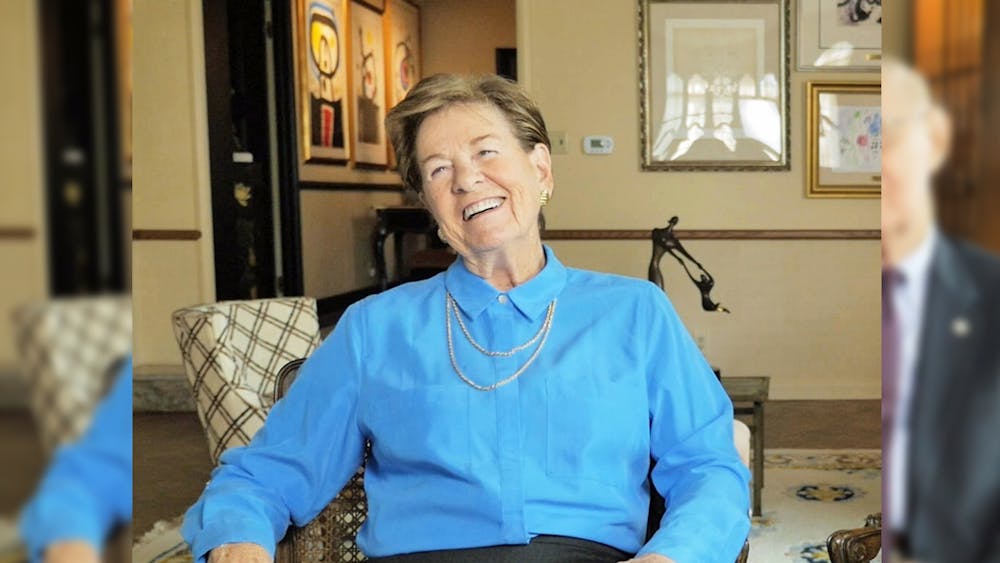Tonight at the Musical Arts Center, the IU Opera Theater will open its production of Giuseppe Verdi's comedic masterpiece and final opera, "Falstaff."\n"I've wanted to write a comic opera for 40 years; I've known 'The Merry Wives of Windsor' for 50," Verdi wrote to a music critic in 1890, 11 years before his death. "However, the usual 'buts' … always prevented me from satisfying this wish of mine. Now (Arrigo) Boito (the librettist) has resolved all the 'buts' and has written me a lyric comedy quite unlike any other … The opera is entirely comic!"\nThe plot, loosely contrived from characters and events from Shakespeare's "Merry Wives of Windsor" and "Henry IV," begins with old Sir John Falstaff attempting to unwittingly seduce two different women by sending them two identical love letters. Deception, jealously, debauchery and all-around chaos ensues.\nThis comic nature brings a sense of energy and excitement to the opera, said conductor David Effron.\n"It's an incredibly youthful work," Effron said. "It's hard to believe it was written by someone of his age ... Some people say it's his greatest opera." \nThe opera is not without its many formidable challenges, said graduate student Kate Lindsey.\n"There are many complicated ensembles," she said. "We are constantly interacting with each other as an ensemble, and it is essential that we are connecting with our colleagues onstage."\nLindsey will be singing the role of Meg in both Friday performances. \n"She is one of the women that Falstaff is trying to seduce," Lindsey said. "(She) plots with her girlfriends about how to get back at Falstaff."\nSir John Falstaff, the title role and object of Meg and company's devious plotting, is a unique dramatic character, said director Vince Liotta, who has directed around two dozen operas since joining IU's music faculty in 1995.\n"Falstaff is a hybrid," Liotta said. "In 'Merry Wives of Windsor,' Falstaff is just a buffoon; in the "Henry IV" he's something of a scoundrel, but he also is a person of much more depth of character. What Boito did was take the personality of Falstaff from the Henry plays and put it into the context of 'Merry Wives.'"\nSinging the part of Falstaff for the Saturday performances will be baritone Timothy Noble, a voice faculty member who has made Falstaff his signature role. \nIn recent years, as the caliber of student performers has steadily increased, the practice of having faculty members perform lead roles has all but disappeared. In this case, however, Noble's presence in the cast proved a valuable learning experience.\n"There are certain distinct advantages to having a faculty member sing this role," said Effron. "You can't help but be infected by it and learn things from him."\nLiotta agreed.\n"Falstaff is a larger-than-life role … and you can do a lot more with it than sing it as an homage to Verdi," he said. "(Through working with Noble), students see how bold you can be, have to be to give a successful performance."\nNoble said he views rehearsing with the cast of students, some of whom have had little stage experience, as a chance to teach these budding professionals about the "baptism of fire" that is the production process.\n"I've really enjoyed the educational process," Noble said.\n"This whole learning process has been relaxed, yet productive." Lindsey said. "We have worked to create a production in which the audience can just sit back, relax and laugh a little or a lot!"\nThe opera will be performed at the Musical Arts Center Nov. 14, 15, 21 and 22 on Jordan Avenue. Tickets are available in the MAC Box Office, or by calling Ticketmaster at 812-333-9955. \n-- Contact staff writer Eric Anderson at eraander@indiana.edu.
'Falstaff' showcases talents of veteran conductor
IU faculty member plays signature role
Get stories like this in your inbox
Subscribe





